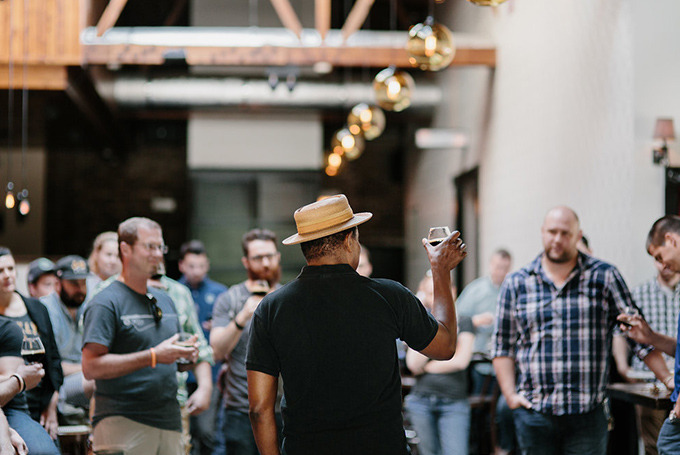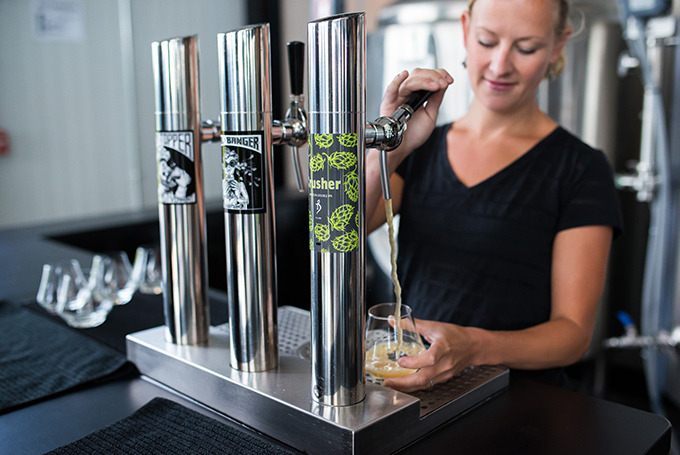Craft Brewers Predict Beer Trends
There will be hops
As we wave goodbye to a year that delivered an abundance of Cheetos-encrusted upheaval, we raise expectations and glassware to 2017. The thirstiest among us will be pleased to learn that American craft brewing is at an all-time high. The Brewers Association tallied more than 5,000 U.S. breweries in operation in November 2016. This represents a sizable gain over the 4,000-plus inventoried in 2015, previously the highest figure since 1873.
Which styles, flavors and practices will dominate in the year to come? We ask some of the country's top brewers to play Hopstradamus and predict the trends.
① Culinary Crossover
Adam Beauchamp, cofounder and brewmaster of Creature Comforts Brewing Co. in Athens, Georgia, foresees more synergy between beer and food worlds. "I think brewers will likely borrow processes and techniques from chefs, including the molecular gastronomist types."
As in the food world, carefully sourced and cult ingredients will gain prominence. "Grain is the soul of beer and is often the most overlooked ingredient in the brewing process," Todd Steven Boera, co-owner and brewer of North Carolina's Fonta Flora Brewery, says. He predicts more breweries will look to alternative and unique grains, specifically those that are local to them, to add a greater range of aromas and flavors.
② Style Watch
The ascendant sour market will continue to grow, according to Brooklyn Brewery's Garrett Oliver. He anticipates massive gains for sour beers in 2017, "going from perhaps 2 percent of overall craft beer sales . . . to more like 5 percent, and then up from there."
Garrett Oliver, Brooklyn Brewery | Photo: Courtesy of Brooklyn Brewery
Likewise, Joe Grimm, of Brooklyn's Grimm Artisanal Ales, expects "more in the category of complex, funky, ambitious mixed fermentations." His label is in the process of building a new East Williamsburg space "with these beers in mind."
Conversely, Jeffrey Stuffings, founder of Jester King Brewery in Austin, Texas, sees "simple, clean lager styles" like pilsner receiving more attention in 2017.
RELATED Don't Beer the Reaper: What to Drink for Every Stage of Your Life "
"A well-made pilsner is delicious and enjoyable, and deserves more respect, in part for how difficult it is to brew," Stuffings says. "I see drinkers choosing them more to balance out beers that are heavily driven by adjunct ingredients."
Josh Pfriem of Oregon's pFriem Family Brewers agrees. In this "exciting beer era" filled with bold flavors, "there is something timeless, simple and very satisfying about well-made and flavorful lagers."
Josh Pfriem, pFriem Family Brewers | Photo: Michelle Humphrey
③ Reigning (and Raining) Hops
IPAs comprised roughly a quarter of the country's craft beer sales in 2016, and will continue to dominate and diversify. Consider New England, or Northeastern, IPAs, a fruity, cloudy subgenre with minimal bitterness being produced by breweries like Massachusetts's Tree House and Trillium. According to Henry Nguyen, co-owner and brewmaster of California's Monkish Brewing Co., these new-wave brews will reinvigorate the IPA category.
"People's perceptions of what an IPA is will change," Nguyen says, citing the "pillowy mouthfeel, low bitterness . . . and perceived sweetness" of new-wave IPAs.
Jeppe Jarnit-Bjergsø, owner and brewer of Brooklyn's Evil Twin Brewing, also sees big things for IPAs in 2017. He predicts "greater experimentation with different formats of hops, like lupulin powder and oil."
④ The More You Grow
As the craft beer industry expands, navigating its crowded space requires increased savvy from everyone involved—especially drinkers.
"It has never been more difficult to spread into outside markets and maintain a real presence," John Kimmich of Vermont cult label The Alchemist explains. "We've always resisted massive growth for the sake of growth. Customers have come to expect a high-quality, fresh beer, and they know when they're not getting it."
The Alchemist | Photo: LuvLens Photography
Some multinational beer conglomerates report flatlining sales, making corporate interest in craft labels inevitable. Chris Boggess, head brewer at 3 Floyds Brewing Co., foresees more buyouts by global giants like Anheuser-Busch InBev. "Hopefully, the beer out of 'bought breweries' will improve and not get watered down for more profit."
Dogfish Head founder Sam Calagione calls upon brewers to "keep or get our shit dialed in tight. Size doesn't matter. Quality, consistency and being well differentiated matters." It's a rousing battle cry for tumultuous times.


